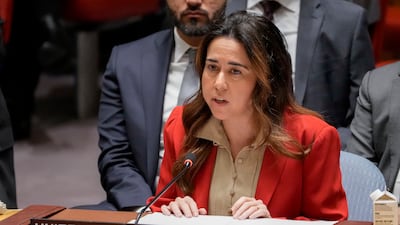The Security Council's 15 member states on Tuesday called for immediate de-escalation and an end to "unilateral actions" after a surge of deadly violence in the occupied West Bank.
The UAE's ambassador to the UN, Lana Nusseibeh, told reporters that the UN special co-ordinator for the Middle East, Tor Wennesland, gave the Council a "concerning overview of the fact that a lack of a political horizon is causing a continual cycle of violence and reprisals on the ground".
Ms Nusseibeh underlined the importance of promoting dialogue and diplomacy and urged "further talks" between Israeli and Palestinian officials.
The closed-door meeting was called by the UAE, the Arab group's representative on the Security Council, after a formal request submitted by the state of Palestine.
This is the third time the UN Security Council has convened an emergency meeting since Israel's far right government of Prime Minister Benjamin Netanyahu came into office two months ago.
Ms Nusseibeh said the UAE asked for the emergency meeting "in light of the worrying developments on the ground in the West Bank", in particular, the raid on Nablus and the incursion into the village of Hawara to the south.
Israeli settlers rampaged through Palestinian towns in the occupied West Bank on Sunday night, torching cars and homes and killing a man.
Sunday’s rioting was a response to a drive-by shooting that killed two brothers from an Israeli settlement.
The incidents came right after a high-level summit meeting between senior officials from Israel, the Palestinian Authority, the US, Jordan and Egypt in the Jordanian city of Aqaba, where Israeli delegates promised to suspend settlement expansion in the West Bank.
The participants issued a joint statement in which the “government of Israel and the Palestinian National Authority confirmed their joint readiness and commitment to immediately work to end unilateral measures for a period of three to six months".
They agreed to convene again in March this year in Egypt to “achieve the goals” set in the Aqaba Joint Communique.
Israeli leaders, including Prime Minister Benjamin Netanyahu, later said they had not agreed to suspending the settlements programme.
Meanwhile, the UN’s Palestinian ambassador, Riyad Mansour, said it was incumbent on the UN Security Council to elevate “itself to the level of taking steps to provide protection to the civilian population, especially after the criminal and terrorist act by settlers in Hawara and the adjacent towns and villages".
Mr Mansour, who was not privy to the closed Security Council meeting, pushed the world body to intervene and provide protection for Palestinians.
"Protection, protection, protection is what the Palestinian civilian population are asking for," he said.
"We believe that the Security Council has a responsibility to shoulder, especially with regard to ... taking steps to provide protection to the civilian population, especially after the criminal and terrorist act by settlers in Huwara and nearby villages."
Mr Mansour said it would have been helpful for Security Council representatives to visit Huwara so they could "see with their own eyes (and) feel the horror in the minds and hearts of children and mothers and their families."
Last week, for the first time in six years, the Security Council denounced in a presidential statement backed by the US, the building of Israeli settlements in the Palestinian territories.
On Tuesday, Hady Amr, the US special representative for Palestinian affairs, visited the West Bank village of Hawara.
“We want to see full accountability and legal prosecution of those responsible for these heinous attacks and compensation for those who lost property or were otherwise affected," Mr Amr said.


